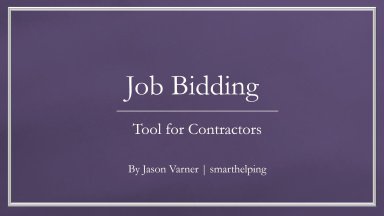
Originally published: 21/03/2024 12:42
Publication number: ELQ-36533-1
View all versions & Certificate
Publication number: ELQ-36533-1
View all versions & Certificate

Job Costing Estimator and Bidding Template
A template framework for general contractors to easily estimate total job costs and come up with a bid.
Description
Bidding on a job that involves multiple worker types and direct material costs requires a comprehensive approach to accurately estimate costs, set a competitive price, and ensure profitability. Here are the mechanics and considerations involved in coming up with this template:
1. Understanding the Scope of Work
This template is also included in two bundles:
Bidding on a job that involves multiple worker types and direct material costs requires a comprehensive approach to accurately estimate costs, set a competitive price, and ensure profitability. Here are the mechanics and considerations involved in coming up with this template:
1. Understanding the Scope of Work
- Detailed Specifications: Begin with a thorough understanding of the job requirements, including all tasks and the quality standards expected.
- Project Timeline: Estimate the duration of the project, considering the availability of workers and materials.
- Identify Worker Types and Skill Levels: Determine the types of workers (e.g., electricians, carpenters) and the skill levels needed for the job.
- Labor Hours: Estimate the number of hours each worker type will need to complete their part of the project.
- Labor Rates: Calculate labor costs using the hourly wage rates for each worker type, including benefits, taxes, and insurance.
- Contingencies: Include a buffer for overtime or unexpected labor needs.
- List of Materials: Create a detailed list of all materials required for the project, specifying quantities and quality levels.
- Supplier Quotes: Obtain quotes from multiple suppliers for the materials to ensure competitive pricing.
- Transportation and Handling: Consider the costs of delivering and handling materials on-site.
- Waste and Loss: Account for potential material waste or loss during the project.
- Include a portion of your indirect costs, such as office expenses, utilities, and equipment depreciation, based on the project's duration and resource allocation.
- Determine your desired profit margin, which will be added to the sum of labor, material, and overhead costs to arrive at the final bid price.
- In this template, you can enter a percentage of total wages and a percentage of other direct costs that drives your profit, or you can zero those inputs out and just enter a percentage that calculates the bid based on the desired profit margin target. The inputs are easy to follow for this and labeled properly.
- Risk Assessment: Identify potential risks that could increase costs or delay the project, such as weather conditions or regulatory issues.
- Risk Contingency: Add a risk contingency percentage to the bid based on the identified risks.
- Market Rates: Research current market rates for similar jobs to ensure your bid is competitive.
- Client Budget: Consider the client's budget constraints without compromising your profit margin.
- Internal Review: Conduct a thorough review of the estimate to ensure all costs are accounted for and that the bid is competitive.
- Client Feedback: Be prepared to adjust your bid based on client feedback or negotiation, ensuring adjustments don't compromise the project's viability.
- Detailed Proposal: Prepare a detailed bid proposal that outlines the scope of work, timelines, cost breakdown, and terms of payment.
- Clear Communication: Ensure your bid clearly communicates the value you bring to the project, distinguishing your offer from competitors.
This template is also included in two bundles:
This Best Practice includes
1 Excel model and 1 Tutorial Video
Further information
Determine a bid or range of bids to submit for a job.
Any general contracting job, up to 7 worker types.





